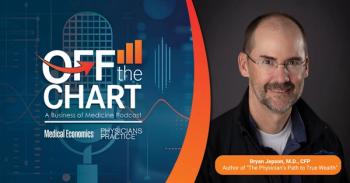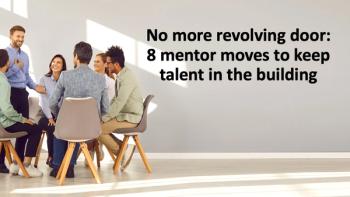
The 8th Principle for Dealing With Physician Stress
Many physicians are women, but the male physician stereotype persists. When a reader requested a more gender neutral example of work-life challenges, here's what we said.
My recent blog on helping physicians deal with the
Rewrite your example. This is stereotyping the male physician with a dependent wife at home with kids relying on his income. 50 percent of medical students are now women. Why not be more creative? Dual career? Female physician with a teacher husband and nanny and kids.
My first reaction was "busted." My second was to explain that I only had room for a single example. (Note: An impulse to explain yourself in response to criticism is always a good indication that the criticism is essentially fair.) The third reaction took some time to bubble up, as I tried to come up with a good example that addressed the stressful environment that confronts female physicians.
The male example had been easy, precisely because it was a stereotype. As a female observing the situation of many male physicians, I was on the outside looking in and oblivious to nuance. Developing an example of a female physician confronted with professional and personal stressors was much more difficult. There was no way I could come up with a single exemplar demonstrating what women physicians deal with in about 200 words.
The reason was that I know too much about their lives. I am not a physician, but I have been a business woman with a demanding job, a husband whose profession demanded a lot of time and placed him under a great deal of stress, two small children who needed a softer me than was appropriate for my subordinates and peers, a house we could almost afford, no recreational time for myself, and feeling guilty because the priority at dinner was "quick, easy, and no arguments." And don't even get me started on the needs for professional development, networking, business development, physical exercise, and time to rest, reflect, and bake cookies.
After close to 100 words, I may be close to describing one person's life, but I still lack plausible scenarios to demonstrate the applicability of the seven principles I suggested for dealing with stress. More problematic, the woman I described represents only one archetype of a modern American woman.
All of this led me to an eighth principle that can help stressed out physicians, male and female:
No. 8: Develop a close relationship with at least one other person in a similar situation.
A primary human need is to be known and understood, to be seen as a three-dimensional person instead of a stereotype. The most obvious benefit is to have someone who really understands your life, and to say "poor baby" or something similar, at the appropriate moments. Just as important is having someone who can help you verbalize and prioritize your wants and needs, and make decisions informed by the knowledge that you cannot have it all, at least not all at the same time. A supportive spouse is a wonderful thing. You also need an ally and sounding board outside of the marriage, precisely because your relationship with your spouse is so important.
Newsletter
Optimize your practice with the Physicians Practice newsletter, offering management pearls, leadership tips, and business strategies tailored for practice administrators and physicians of any specialty.






